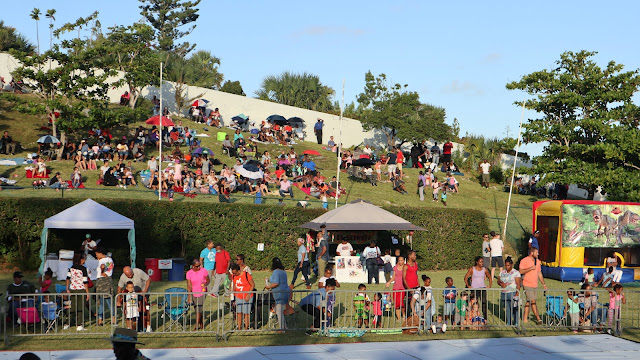 |
| With Hon. E. David Burt, JP, MP, the new Premier of Bermuda, at the Gombeys Festival in Hamilton, Bermuda |
Last Friday, I was in Bermuda to give the 12th Annual Dr. Kenneth E. Robinson and Cyril Outerbridge Packwood Memorial Lecture, at the invitation of the territory's Department of Community and Cultural Affairs. The lecture series, for the first time, coincided with the Gombey Festival, which one of Bermuda's major cultural events.
Truth be told, I did not know about this impressive masking tradition, until my invitation in September to speak about masking in Africa and the African Diaspora. Learning about the Gombey was revelatory, especially for someone like me who holds dear the Igbo tradition of beautiful, colorful dancing masks, such as Ulaga, Ogba-Mgbada, Agbogho Mmuo, Ogwulugwu, and others. The Gombey, in its emphasis on vigorous dance routines, reminiscent of various West Africa masks, is celebrated for its high tempo, lyrical and acrobatic dance. The history of the Gombey and its relationship to other similar masked performances in St. Kitts, Dominican Republic, and other Caribbean Islands are still being sorted out by historians. It sure deserves an art history/visual culture dissertation-level study, not simply because I suspect it would open up new ways of thinking about the cultural histories of these Islands' interrelationships, but also their connections to Africa. But also simply because this is one hell of a masking phenomenon, with a history conflictual relationship with Colonial-era regimes and elite society.
 |
| Remembrance for Terry "Termite" Simmons (1954-17), a celebrated leader of the Gombeys |
 |
| Bermuda Donqili Dancers, Directed by Michael Simmons |
 |
| Guro mask acquired from Cote d'Ivoire introduced to the Festival for the first time by Michael Simmons |
The major question, now that the government of Bermuda has more or less taken up the Gombey as a key part of the territory's cultural heritage and folklife, is how to sustain it, without turning it into full-blown tourist item, and in the process sidelining the families and groups for whom the event still is a vital part of their heritage, an important vehicle for asserting their links to the past even as they struggle to make a living in the present.







No comments:
Post a Comment